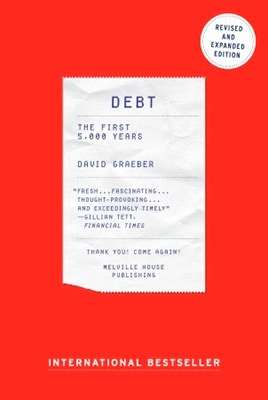Debt
The First 5,000 Years

Editorial Melville House Publishing
Fecha de edición octubre 2014 · Edición nº 1
Idioma inglés
EAN 9781612194196
560 páginas
Libro
encuadernado en tapa blanda
Resumen del libro
Before there was money, there was debt
Every economics textbook says the same thing: Money was invented to replace onerous and complicated barter systems--to relieve ancient people from having to haul their goods to market. The problem with this version of history? There's not a shred of evidence to support it.
Here anthropologist David Graeber presents a stunning reversal of conventional wisdom. He shows that for more than 5,000 years, since the beginnings of the first agrarian empires, humans have used elaborate credit systems to buy and sell goods--that is, long before the invention of coins or cash. It is in this era, Graeber argues, that we also first encounter a society divided into debtors and creditors.
Graeber shows that arguments about debt and debt forgiveness have been at the center of political debates from Italy to China, as well as sparking innumerable insurrections. He also brilliantly demonstrates that the language of the ancient works of law and religion (words like "guilt," "sin," and "redemption") derive in large part from ancient debates about debt, and shape even our most basic ideas of right and wrong. We are still fighting these battles today without knowing it.
"Debt: The First 5,000 Years "is a fascinating chronicle of this little known history--as well as how it has defined human history, and what it means for the credit crisis of the present day and the future of our economy.
Biografía del autor
David Graeber (1961-2020) fue doctor en Antropología y profesor del Goldsmiths College de Londres. Con un largo historial de activismo y compromiso político, colaboró en medios como The Nation, The Guardian o Harper's Magazine, entre otros. En 2006 la London School of Economics le reconoció como un destacado antropólogo que transformó radicalmente el estudio de la cultura. Fue un pensador icónico y un renombrado activista, y sus primeros esfuerzos en el Parque Zuccotti hicieron de Occupy Wall Street el movimiento que definió toda una era. Es autor de En deuda, de Trabajos de mierda y de La utopía de las normas. Además, es coautor, con David Wengrow, del superventas El amanecer de todo: Una nueva historia de la humanidad. Todo ellos publicados en Ariel.








